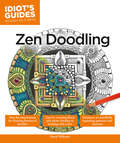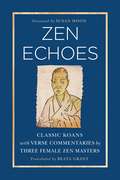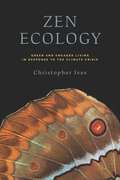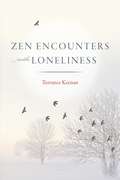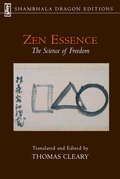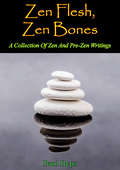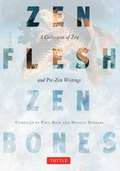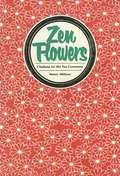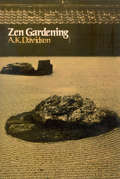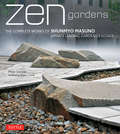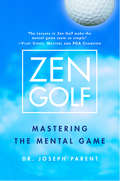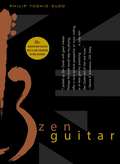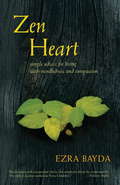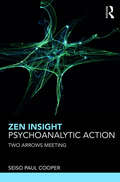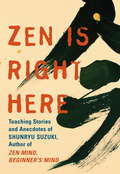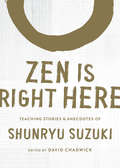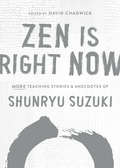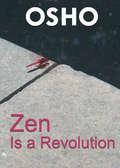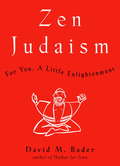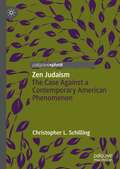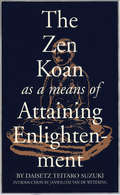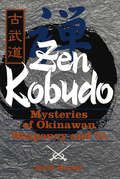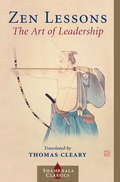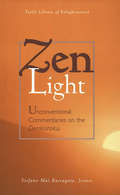- Table View
- List View
Zen Doodling (Idiot's Guides)
by David WilliamsDoodling isn't necessarily a mindless pursuit. There's hidden discipline, order, and joy behind artful scribbles. Idiot's Guides: Zen Doodling gives readers beautiful, full-color instruction and all they need to start using ordered, repeated "tangle" designs that are great creative expressions and works of art unto themselves. The book includes step-by-step instructions for drawing more than 20 doodle forms and patterns.
Zen Echoes: Classic Koans with Verse Commentaries by Three Female Chan Masters
by Susan Moon Beata GrantThe voices of three female Zen masters reverberate in this much-needed collection.Too often the history of Zen seems to be written as an unbroken masculine line: male teacher to male student. In this timely volume, Beata Grant shows us that women masters do exist—and have always existed. Zen Echoes is a collection of classic koans from Zen’s Chinese history that were first collected and commented on by Miaozong, a twelfth-century nun so adept that her teacher, the legendary Dahui Zonggao, used to tell other students that perhaps if they practiced hard enough, they might be as realized as her. Nearly five hundred years later, the seventeenth-century nuns Baochi and Zukui added their own commentaries to the collection. The three voices—distinct yet harmonious—remind us that enlightenment is at once universal and individual. In her introduction to this shimmering translation, Professor Grant tells us that the verses composed by these women provide evidence that “in a religious milieu made up overwhelmingly of men, there were women who were just as dedicated to Chan practice, just as advanced in their spiritual realization, and just as gifted at using language to convey that which is beyond language.”
Zen Ecology: Green and Engaged Living in Response to the Climate Crisis
by Christopher IvesDiscover a way of living that can help you slow down and stay grounded—and at the same time reduce your ecological impact and engage more fully with the climate crisis.It may seem as though living ecologically and engaging in activism sacrifices our own enjoyment and happiness on the altar of doing the right thing. In this book, professor, naturalist, and Buddhist author Christopher Ives offers an alternative: a way of living that can actually be more fulfilling than the modern consumerist lifestyle. Rather than deprivation, it can bring us richness. In Zen Ecology, Chris outlines his environmental ethic as a series of concentric circles, beginning with ourselves and then moving outward into our communities, all the while focusing on spaciousness, mindfulness, generosity, and contentment. At the individual level, we deal with distraction, clutter, and ecological harm. Here, Chris offers ways to help us pay attention, simplify our lives, and lower our impact. Then, we explore how to envision our home as a &“place of the Way,&” with Zen monastic life as a model for this—without having to be a monk! Next, we realize our embeddedness in nature and emplace ourselves in community with others, including other forms of life. Finally, we build on this basis to engage in activism to create a world that is more supportive of ecological health and spiritual fulfillment. In this way, we avoid the two extremes of apathy and burnout, and uncover a way of living that is simple, joyful, embedded in nature, connected to others in community, and supportive of collective action.
Zen Encounters with Loneliness
by Terrance KeenanEmbark on a poignant and sometimes comic journey through Zen, poetry, and the transformative, personal practice of writing.In Zen Encounters with Loneliness Terrance Keenan weaves together poetry, memoir, and raw insight to give voice to the lonely "nobody" in everyone. From his memories of early childhood to his struggles with addiction, writer's block, and human relationship, Keenan delivers a heart-rending portrayal of the human hunger for selfhood and connection. Through his beautifully crafted literary reflections, he finds that Zen does not comfort our dream of being somebody, rather, it reveals connection only when we face who we really are--nobody. Zen Encounters intimately calls us to recognize that the well of emptiness is also a well of potential--to grow, learn, and overcome adversity.
Zen Essence
by Thomas ClearyDrawn from the records of Chinese Zen masters of the Tang and Song dynasties, this collection may surprise some readers. In contrast to the popular image of Zen as an authoritarian, monastic tradition deeply rooted in Asian culture, these passages portray Zen as remarkably flexible, adaptive to contemporary and individual needs, and transcending cultural boundaries.The readings contained in Zen Essence emphasize that the practice of Zen requires consciousness alone and does not depend on a background in Zen Buddhism and Asian culture. The true essence of Zen resides in the relationship between mind and culture, whatever that culture might be. This unique collection of writings creates a picture of Zen not as a religion or philosophy, but as a practical science of freedom.
Zen Flesh, Zen Bones: A Collection Of Zen And Pre-Zen Writings
by Paul RepsWhen Zen Flesh, Zen Bones was published in 1957 it became an instant sensation with an entire generation of readers who were just beginning to experiment with Zen. Over the years it has inspired leading American Zen teachers, students, and practitioners. Its popularity is as strong today as ever.Zen Flesh, Zen Bones is a book that offers a collection of accessible, primary Zen sources so that readers can struggle over the meaning of Zen for themselves. It includes 101 Zen Stories, a collection of tales that recount actual experiences of Chinese and Japanese Zen teachers over a period of more than five centuries; The Gateless Gate, the famous thirteenth century collection of Zen koans; Ten Bulls, a twelfth century commentary on the stages of awareness leading to enlightenment; and Centering, a 4,000 year-old teaching from India that some consider to be the roots of Zen.--Print Ed.
Zen Flesh, Zen Bones: A Collection of Zen and Pre-Zen Writings
by Paul Reps Nyogen Senzaki"Zen Flesh, Zen Bones" is four books in one - books that would rank high in the canon of Zen, if Zen were so non-Zen as to have scriptures. "101 Zen Stories" recounts experiences of Chinese and Japanese Zen teachers over a period of more than five centuries. "The Gateless Gate" offers a collection of 13th-century koans to sit with in practice. "10 Bulls" is a 12th-century commentary on the stages of awareness leading to enlightenment. Finally "Centering," a 4,000 year-old teaching from India, offers what some would consider to be the roots of Zen. When this book was first published in 1957 it became a guide for an entire generation of western seekers who were just beginning to explore Zen. In the years since it has inspired leading American Zen teachers, students, and practitioners. Join them.
Zen Flowers: Chabana for the Tea Ceremony
by Henry MittwerThis Zen flower arranging book teaches the delicate art of Japanese Chabana--the precursor to ikebana.<P><P>Up to now, with the exception of Okakura Kakuzo's excellent account of flowers used in the art of Chanoyu in his delightful The Book of Tea, almost nothing has been available on the subject. To my knowledge, the present volume is the only book written in English that is wholly devoted to the special form of flower arrangement called Chabana.Chabana is a type of flower arrangement that originated in the tea room . Chabana is not only for decoration, for symbolic representation, or for abstract expression of the self. 2,500years ago, Chabana has something in common with one of Shakyamuni Buddha's sermons. Buddha lightly picked a single bloom from a basketful of flowers offered to Him by one of the multitude who came to hear His sermon. Buddha slowly, silently, held up the flower before the congregation. Among the gathering was one of His disciples, Mahakasyapa, who gently smiled as he apprehended the Buddha's gesture. Chabana may not be a flower arrangement having a Zen-like mission, but it certainly is a flower arrangement appreciated by a mind nourished with the Zen principles of simplicity and directness.
Zen Gardening
by A. K. DavidsonThe Zen gardens of Japan are places in which to meditate. They can be anything from a landscaped garden, complete with waterfalls, to a bed of raked pebbles. This ancient way of gardening goes back to the Zen Buddhist priest-gardeners of the thirteenth century. Based on abstract compositions, relying on simplicity and suggestion, their gardens were designed to liberate the imagination, while providing a starting point in the appreciation of everyday things.Zen Gardening is the first handbook to examine the concepts and techniques that make up this garden art and to apply them to the West. It explains the historical relationship between Zen and the development of gardens, and gives practical suggestions for the creation of a Zen garden at home. The chapters on the garden components and their adaptation for the West, principles of design, and construction work, are illustrated with over 150 line drawings. Step by step they show us how to make the most of corners of large gardens, of plots not large enough for lawns and flower beds, or of awkward passageways, alleys and terraces.The principles of Zen gardening are particularly relevant in our crowded conurbations. Keir Davidson's thoughtful and practical approach enables us to maximize our garden space and to create areas of calm in our own immediate environment. Without precedent in the West, his book will be a source of delight to gardeners of every persuasion.
Zen Gardens
by Mira Locher Uchida ShigeruShunmyo Masuno, Japan's leading garden designer, is at once Japan's most highly acclaimed landscape architect and an 18th-generation Zen Buddhist priest, presiding over daily ceremonies at the Kenkoji Temple in Yokohama. He is celebrated for his unique ability to blend strikingly contemporary elements with the traditional design vernacular. He has worked in ultramodern urban hotels and in some of Japan's most famous classic gardens. In each project, his work as a designer is inseparable from his Buddhist practice. Each becomes a Zen garden, "a special spiritual place where the mind dwells."This beautiful book, illustrated with more than 400 drawings and color photographs, is the first complete retrospective of Masuno's work to be published in English. It presents 37 major gardens around the world in a wide variety of types and settings: traditional and contemporary, urban and rural, public spaces and private residences, and including temple, office, hotel and campus venues. Masuno achieved fame for his work in Japan, but he is becoming increasingly known internationally, and in 2011 completed his first commission in the United States which is shown here.The book, divided into three chapters, covers: "Traditional Zen Gardens," "Contemporary Zen Gardens," and "Zen Gardens outside Japan." Illustrated with photographs and architectural plans or sketches, each garden is described and analyzed by author Mira Locher, herself an architect and a scholar well versed in Japanese culture.Celebrating the accomplishments of a major, world-class designer, Zen Gardens also serves as something of a master class in Japanese garden design and appreciation: how to perceive a Japanese garden, how to understand one, even how to make one yourself. Like one of Masuno's gardens, the book can be a place for contemplation and mindful repose.
Zen Golf: Mastering the Mental Game
by Joseph ParentThe best players know that golf is a game of confidence, and most important, concentration-the ability to focus and block out distraction. The goal of achieving clear thought is also at the heart of Buddhist teachings. In his highly original and groundbreaking book, noted PGA coach and Buddhist instructor, Dr. Joseph Parent, draws on this natural connection and teaches golfers how to clear their minds, achieve ultimate focus, and play in the moment for each shot.Zen Golf presents a simple system for building "mental game mastery." Dr Parent's unique PAR Approach (focusing on Preparation, Action, and Response to Results) guides golfers with specific techniques for each aspect of their games. In chapters such as "How to Get From the Practice Tee to the First Tee", "You Produce What You Fear", and "How to Enjoy a Bad Round of Golf", the author shares a personal teaching regimen that has helped improve the games of professionals and amateurs alike. By combining classic insights and stories from Zen tradition, Zen Golf helps eliminate the mental distractions that routinely cause poor shots and loss of concentration, allowing golfers to feel in "the zone" that professionals have learned to master.Clear, concise, and enlightening, Zen Golf shows golfers how to prepare for, execute, and equally important, respond the results of any golf shot. A different approach to golf instruction, this book shapes ancient philosophies into new teachings.From the Hardcover edition.
Zen Guitar: The Zen Way To Play Guitar, Book And Cd
by Philip Toshio SudoUnleash the song of your soul with Zen Guitar, a contemplative handbook that draws on ancient Eastern wisdom and applies it to music and performance.Each of us carries a song inside us, the song that makes us human. Zen Guitar provides the key to unlocking this song--a series of life lessons presented through the metaphor of music. Philip Sudo offers his own experiences with music to enable us to rediscover the harmony in each of our lives and open ourselves to Zen awareness uniquely suited to the Western Mind. Through fifty-eight lessons that provide focus and a guide, the reader is led through to Zen awareness. This harmony is further illuminated through quotes from sources ranging from Eric Clapton and Jimi Hendrix to Miles Davis. From those who have never strummed a guitar to the more experienced, Zen Guitar shows how the path of music offers fulfillment in all aspects of life--a winning idea and an instant classic.
Zen Heart: Simple Advice for Living with Mindfulness and Compassion
by Ezra BaydaThere's a secret to spiritual practice, and it's surprisingly simple: learn to be present with attention. Do that, and the whole world becomes your teacher, you wake up to the sacredness of every aspect of existence, and compassion for others arises without even thinking about it. In Zen Heart, Bayda provides a wealth of practical advice for making difficult experiences a valued part of the path and for making mindfulness a daily habit.
Zen Insight, Psychoanalytic Action: Two Arrows Meeting
by Seiso Paul CooperDrawing from original source material, contemporary scholarship, and Wilfred Bion’s psychoanalytic writings, Zen Insight, Psychoanalytic Action: Two Arrows Meeting introduces the Zen notion of "gūjin," or total exertion, and elaborates a realizational perspective that integrates Zen Buddhism and psychoanalysis. Developed by the thirteenth century Zen teacher and founder of the Japanese Soto Zen school, Eihei Dogen, gūjin finds expression and is referenced in various contemporary scholarly and religious commentaries. This book explains this pivotal Zen concept and addresses themes by drawing from translated source material, academic scholarship, traditional Zen kōans and teaching stories, extensive commentarial literature, interpretive writings by contemporary Soto Zen teachers, psychoanalytic theory, clinical material, and poetry, as well as the author’s thirty years of personal experience as a psychoanalyst, supervisor, psychoanalytic educator, ordained Soto Zen priest, and transmitted Soto Zen teacher. From a realizational perspective that integrates Zen and psychoanalytic concepts, the book addresses anxiety-driven interferences to deepened Zen practice, extends the scope and increases the effectiveness of clinical work for the psychotherapist, and facilitates deepened experiences for both the Buddhist and the secular meditation practitioner. Two Arrows Meeting will be of great interest to researchers in the fields of Zen Buddhism and psychoanalysis. It will also appeal to meditation practitioners and psychoanalysts in practice and training.
Zen Is Right Here: Teaching Stories and Anecdotes of Shunryu Suzuki, Author of Zen Mind, Beginner's Mind
by David ChadwickShunryu Suzuki's extraordinary gift for conveying traditional Zen teachings using ordinary language is well known to the countless readers of Zen Mind, Beginner's Mind. In Zen Is Right Here, his teachings are brought to life powerfully and directly through stories told about him by his students. These living encounters with Zen are poignant, direct, humorous, paradoxical, and enlightening; and their setting in real-life contexts makes them wonderfully accessible. Like the Buddha himself, Suzuki Roshi gave profound teachings that were skilfully expressed for each moment, person, and situation he encountered. He emphasized that while the ungraspable essence of Buddhism is constant, the expression of that essence is always changing. Each of the stories presented here is an example of this versatile and timeless quality, showing that the potential for attaining enlightenment exists right here, right now, in this very moment.
Zen Is Right Here: Teaching Stories and Anecdotes of Shunryu Suzuki, Author of Zen Mind, Beginner's Mind
by Shunryu SuzukiPersonal stories and anecdotes of the trailblazing Zen teacher Suzuki Roshi--now reissued in hardcover in tandem with the publication of the follow-up volume, Zen Is Right Now. Shunryu Suzuki&’s extraordinary gift for presenting traditional Zen teachings using ordinary language is well known to the countless readers of Zen Mind, Beginner&’s Mind. In Zen Is Right Here, his teachings are brought to life through stories told by his students. These living encounters with Zen are poignant, direct, humorous, paradoxical, and enlightening—and their setting in real-life contexts makes them wonderfully accessible. Like the Buddha himself, Shunryu Suzuki gave profound teachings that were skillfully expressed for each moment, person, and situation he encountered. He emphasized that while the essence of Buddhism is constant, the expression of that essence is always changing. Each of the stories presented here is an example of this versatile and timeless quality, showing that the potential for attaining enlightenment exists right here, at this very place.
Zen Is Right Now: More Teaching Stories and Anecdotes of Shunryu Suzuki, Author of Zen Mind, Beginner's Mind
by Shunryu SuzukiIn this new collection of quotes from Shunryu Suzuki Roshi and stories from his students, the presence, wisdom, and humor of a great Zen teacher come alive once more.The teachings of Shunryu Suzuki have served for innumerable people as the gateway to Zen practice and meditation. In Zen Is Right Now, devoted student and biographer David Chadwick sheds new light on Suzuki&’s presence and teachings through selected quotes from his lectures and a variety of stories told by his students. Complementary to another collection about Suzuki, Zen Is Right Here, this book offers a joyful bounty of anecdotes and insights, revealing a playful and deeply wise teacher who delighted in paradox and laughed often. Each of the stories and quotes presented here is an example of the versatile and timeless quality evident in Suzuki&’s teaching, showing that the potential for attaining enlightenment exists right now, in this very moment.
Zen Is a Revolution
by Osho Osho International FoundationIn this talk Osho takes his audience into the world of ZEN. "There are a few essential things which make Zen absolutely different from any kind of teaching. The most important of these essentials is that Zen is a revolution. All other religions are servants to the vested interests. The rich people and the powerful people, the politicians, have dominated all the religions. The priests have been nothing but servants to these criminals. It is such a worldwide conspiracy that no one recognizes it. It is so obvious and so simple that we are from the very beginning, from our very childhood, being programmed." From an original series: Rinzai: Master of the Irrational, by Osho.
Zen Judaism
by David M. BaderFew spiritual practices are more intriguing or elusive than those of Zen Judaism," says David M. Bader in the foreword to Zen Judaism. "This growing movement offers a unique way to follow in the footsteps of the Buddha, ideally without gaining quite so much weight." These nearly 100 sacred teachings are capable "of bringing about an enlightenment experience so pure, so elevating, and so intense, you could plotz." For you, some samples:To know the Buddha is the highest attainment. Second highest is to go to the same doctor as the Buddha.Be here now. Be someplace else later. Is that so complicated? There is no escaping Karma. In a previous life, you never called, you never wrote, you never visited. And whose fault was that?If there is no self, whose arthritis is this? Be patient and achieve all things. Be impatient and achieve all things faster.From the Hardcover edition.
Zen Judaism: The Case Against a Contemporary American Phenomenon
by Christopher L. SchillingContemporary Judaism is transforming, especially in America, from a community experience to more of a do-it-yourself religion focused on the individual self. In this book Christopher L. Schilling offers a critique of this transformation. Schilling discusses problematic aspects of Jewish mindfulness meditation, and the relationship between Judaism and psychedelics, proceeding to explore the science behind these developments and the implications they have for Judaism.
Zen Koan as a Means of Attaining Enlightenment
by Daisetz Teitaro SuzukiZen Koan as a Means of Attaining Enlightenment Presents the history and application of the koan exercise--the means for realizing enlightenment--with depth and clarity.<P><P>The koan system has effected a special development in Zen Buddhism, and is a unique contribution to the history of religious consciousness. When the importance of the koan is understood, it may be said that more than half of Zen is understood.
Zen Kobudo
by Mark BishopKobudo, the famous armed Okinawan fighting art that utilizes common farming implements in combat, and Te, the ancient Okinawan art of armed and unarmed combat, are two of the world's most widely practiced yet least-understood martial arts. This book studies the individual Kobudo and Te systems as they are practiced in Okinawa today and discusses their various histories and the lives of the masters who have most influenced them. Spiritualism in the Okinawan arts is also covered in detail, as the author masterfully describes the mix of Zen and native beliefs that are vital to these arts, yet a component that has been all but ignored by previous researchers. In addition, this is the first work to discuss anthropological theories on Okinawa and the development of fighting arts there from the Stone Age. This complete and wide-ranging study of Okinawan weaponry, history, and training is the ultimate guide to these important fighting arts.
Zen Kobudo
by Mark BishopKobudo, the famous armed Okinawan fighting art that utilizes common farming implements in combat, and Te, the ancient Okinawan art of armed and unarmed combat, are two of the world's most widely practiced yet least-understood martial arts. This book studies the individual Kobudo and Te systems as they are practiced in Okinawa today and discusses their various histories and the lives of the masters who have most influenced them. Spiritualism in the Okinawan arts is also covered in detail, as the author masterfully describes the mix of Zen and native beliefs that are vital to these arts, yet a component that has been all but ignored by previous researchers. In addition, this is the first work to discuss anthropological theories on Okinawa and the development of fighting arts there from the Stone Age. This complete and wide-ranging study of Okinawan weaponry, history, and training is the ultimate guide to these important fighting arts.
Zen Lessons: The Art of Leadership
by Thomas ClearyThis guide to enlightened conduct for people in positions of authority is based on the teachings of several great Chinese Zen masters. Drawing on private records, letters, and long-lost documents of the Song dynasty (tenth to thirteenth centuries), Zen Lessons consists of short excerpts written in language that is accessible to the reader without any background in Eastern philosophy. This book serves as a guide to recognizing the qualities of a genuine Zen teacher; it also serves as a study of the character and conduct necessary for the mastery of any position of power and authority--whether religious, social, political, or organizational.
Zen Light
by Stefano Mui BarragatoThe Denkoroku, or "Record of Transmitting the Light," contains the enlightenment stories of the earliest Zen ancestors. In Zen Ught, the author comments on this Buddhist classic, which he studied as part of his own advanced Zen training. Sensei Barragato brings the varied experiences of his life and his studies in Catholicism and Quaker practice to the teachings of Zen Buddhism, making these commentaries at once off-beat, refreshing, and revealing. He touches on the major issues that affect our lives, making thisbook of interest to both the beginning as well as the advanced student of Zen.
